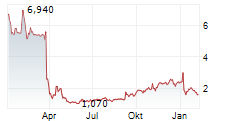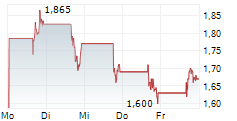
ACR-2316, which was internally discovered using biological SAR enabled by AP3 to overcome limitations of benchmark clinical WEE1 and PKMYT1 inhibitors, demonstrates potent anticancer activity in preclinical studies and is planned for monotherapy clinical development
AP3 profiling uncovered actionable pathways linked to resistance mechanisms for ACR-368, a clinical-stage CHK1/2 inhibitor, and identified ultra-low dose gemcitabine (ULDG) to sensitize resistant ovarian cancer cells to ACR-368
WATERTOWN, Mass., April 10, 2024 (GLOBE NEWSWIRE) -- Acrivon Therapeutics, Inc. ("Acrivon" or "Acrivon Therapeutics") (Nasdaq: ACRV), a clinical stage biopharmaceutical company developing precision oncology medicines that it matches to patients whose tumors are predicted to be sensitive to each specific medicine by utilizing its proprietary proteomics-based patient responder identification platform, Acrivon Predictive Precision Proteomics (AP3), today announced data from two posters that the company presented at the American Association for Cancer Research (AACR) Annual Meeting.
"Our data at AACR illustrate several of the broad capabilities of our AP3 platform and the power of employing this precision proteomics-based approach in both drug discovery and drug development," said Peter Blume-Jensen, M.D., Ph.D., chief executive officer, president, and founder of Acrivon Therapeutics. "Uniquely enabled by AP3, we designed a selective and potent dual inhibitor of both WEE1 and PKMYT1, ACR-2316, designed for potent single agent activity. We presented preclinical data showing its superior activity versus benchmark WEE1 and PKMYT1 single-agent inhibitors in multiple cancer models and look forward to advancing this compound into the clinic. Additionally at AACR, we presented data on the underlying mechanisms that drive resistance to treatment with ACR-368, which were discovered through AP3 profiling, and which led to the identification of ULDG as a way to sensitize resistant ovarian cancer cells to ACR-368. These actionable insights highlight Acrivon's differentiated approach to drug development."
In a poster titled "ACR-2316: A potentially first-in-class, potent, selective WEE1/PKMYT1 inhibitor rationally designed for superior single agent activity through synergistic disruption of cell cycle checkpoints," preclinical data showing that ACR-2316 is a potent dual WEE1/PKMYT1 inhibitor with superior anticancer activity were presented. ACR-2316 was highly potent across multiple human tumor cell lines and patient-derived ex vivo tumor models. In proliferation assays across a panel of 19 cancer cell lines, ACR-2316 demonstrated greater potency in all cell lines tested compared to adavosertib and lunresertib (mean IC50 = 70, 252 and 364 nM, respectively). In the 12 ovarian cancer patient-derived xenograft models tested, superior ex vivo anticancer activity of ACR-2316 was observed compared to azenosertib and lunresertib (mean IC50 = 9, 248 and 1620 nM, respectively). The complete responses observed with ACR-2316 in human tumor xenograft mouse models were associated with strong WEE1 and balanced PKMYT1 inhibition activity in tumors.
In the second poster titled "Acrivon predictive precision proteomics (AP3) uncovers mechanism of resistance to ACR-368, a clinical-stage CHK1/2 inhibitor, and identifies rational combination treatment," preclinical studies using five ovarian cancer cell lines that were generated to be durably resistant to ACR-368 were reported. These cell lines were profiled using AP3 mass spectrometry, and comprehensive pathway reconstitution, and kinase activity analysis was performed to identify drug resistance mechanisms to ACR-368 to uncover actionable vulnerabilities. As a result, ULDG was identified as a rational sensitization treatment, and in in vivo CDX and PDX models of ovarian cancer, data confirmed that ULDG sensitizes cancer cells to ACR-368. This corresponded with the subsequent upregulation of ACR-368 OncoSignature biomarkers, indicating that the OncoSignature assay can predict which ULDG sensitized tumors would be responsive to treatment with ACR-368.
About Acrivon Therapeutics
Acrivon is a clinical stage biopharmaceutical company developing precision oncology medicines that it matches to patients whose tumors are predicted to be sensitive to each specific medicine by utilizing Acrivon's proprietary proteomics-based patient responder identification platform, Acrivon Predictive Precision Proteomics, or AP3. The AP3 platform is engineered to measure compound-specific effects on the entire tumor cell protein signaling network and drug-induced resistance mechanisms in an unbiased manner. These distinctive capabilities enable AP3's direct application for drug design optimization for monotherapy activity, the identification of rational drug combinations, and the creation of drug-specific proprietary OncoSignature companion diagnostics that are used to identify the patients most likely to benefit from Acrivon's drug candidates. Acrivon is currently advancing its lead candidate, ACR-368, a selective small molecule inhibitor targeting CHK1 and CHK2 in a potentially registrational Phase 2 trial across multiple tumor types. The company has received Fast Track designation from the Food and Drug Administration, or FDA, for the investigation of ACR-368 as monotherapy based on OncoSignature-predicted sensitivity in patients with platinum-resistant ovarian or endometrial cancer. Acrivon's ACR-368 OncoSignature test, which has not yet obtained regulatory approval, has been extensively evaluated in preclinical studies, including in two separate, blinded, prospectively-designed studies on pretreatment tumor biopsies collected from past third-party Phase 2 trials in patients with ovarian cancer treated with ACR-368. The FDA has granted Breakthrough Device designation for the ACR-368 OncoSignature assay for the identification of ovarian cancer patients who may benefit from ACR-368 treatment. In addition to ACR-368, Acrivon is also leveraging its proprietary AP3 precision medicine platform for developing its co-crystallography-driven, internally-discovered preclinical stage pipeline programs. These include ACR-2316, a potent, selective WEE1/PKMYT1 inhibitor designed for superior single-agent activity as demonstrated in preclinical studies against benchmark inhibitors, and a cell cycle program with an undisclosed target.
Forward-Looking Statements
This press release includes certain disclosures that contain "forward-looking statements" within the meaning of the Private Securities Litigation Reform Act of 1995 about us and our industry that involve substantial risks and uncertainties. All statements other than statements of historical facts contained in this press release, including statements regarding our future results of operations or financial condition, business strategy and plans and objectives of management for future operations, are forward-looking statements. In some cases, you can identify forward-looking statements because they contain words such as "anticipate," "believe," "contemplate," "continue," "could," "estimate," "expect," "intend," "may," "plan," "potential," "predict," "project," "should," "target," "will," or "would" or the negative of these words or other similar terms or expressions. Forward-looking statements are based on Acrivon's current expectations and are subject to inherent uncertainties, risks and assumptions that are difficult to predict. Factors that could cause actual results to differ include, but are not limited to, risks and uncertainties that are described more fully in the section titled "Risk Factors" in our reports filed with the Securities and Exchange Commission. Forward-looking statements contained in this press release are made as of this date, and Acrivon undertakes no duty to update such information except as required under applicable law.
Investor and Media Contacts:
Adam D. Levy, Ph.D., M.B.A.
alevy@acrivon.com
Alexandra Santos
asantos@wheelhouselsa.com



